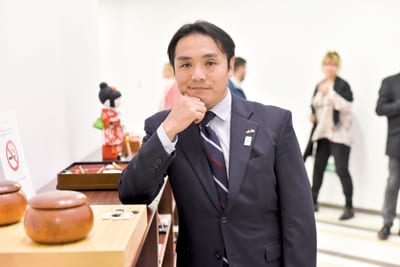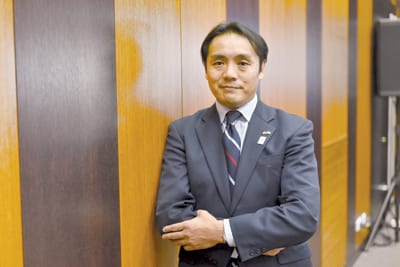Japan has recognised Serbia’s need for support every time that it has faced difficult times, such as during the 2014 floods and the ongoing struggle to accommodate migrants. Moreover, the mutual friendship between two countries has been confirmed many times and in different areas of cooperation
In this interview Yoshifumi Kanno, First Secretary at the Embassy of Japan in Belgrade, discusses the economic, cultural and humanitarian aspects of cooperation between Japan and Serbia, offering important advice to Serbian companies looking to debut on the Japanese market.
Given that you are a diplomat with many years of experience in Serbia, can you tell us how much progress you have noted in Serbia in terms of reforms and approaching the standards of the EU?
The three and a half years that I have so far spent in Serbia working at the Embassy have provided me with enough of a timeframe to analyse the progress of Serbia’s EU integration process. It is especially interesting to do that during times of global political turmoil and to see how Serbia handles these unpredictable times.
In my view, Serbia has a stable course towards the European Union that is in line with its government’s policy, which has set EU accession as a four-year goal. The process requires further adjustment of Serbia’s legislation, procedures and policies to suit those of the European Union. We could see that several official documents, including the EU Progress Report and the White Book presented by the Foreign Investors Council, confirm that the level of adjustment is high and that your country is on the right road to fulfilling the necessary criteria for joining the EU in the near future.
Of course, the complete implementation in the field of changes, primarily new legislation and regulations, requires some time, as we can witness through disputes between lawmakers and citizens or the business sector. To reduce this, the Serbian Government needs to work hard on improving the efficiency of the public sector, especially in administrative procedures and the bureaucracy system. This is a problem everywhere in the world, which is no excuse for Serbia in comparison to other countries.
The Government of Japan provides not only financial assistance to Serbia but also technical support. Could you tell us about some of the projects that you have implemented during your stay in Serbia?
The Government of Japan, through the Embassy of Japan to Serbia, but also through some other institutions, such as the Japan International Cooperation Agency (JICA) and Japan External Trade Organisation (JETRO), intends to enable the further development of bilateral ties through various projects in the public and private sectors.
Through the exchange of state employees, often of lower ranks, experts and consultants, Japan tries to implement some of our knowledge and experience in sectors like investments, SME organisation, culture or sports, and to help Serbia improve its results in these fields.
One long-running project that the Embassy and JICA implement is the introduction of Kaizen to Serbian companies. Kaizen, or the process of constant improvement in Japanese, help Serbian SMEs develop their business by improving and perfecting small procedures, details that might not seem important at first but which can save you significant time and money for future improvement and investment.

On the other hand, JETRO cooperates continuously with the Serbian Development Agency (RAS) and sends investment consultants that help this Agency improve its work, but also introduces Japanese companies with the potential of Serbia. We hope that very soon we will organise a mission of Japanese companies that would receive information on the ground about the business potentials of this country.
We are also proud to see that more and more Serbian citizens enjoy traditional Japanese martial arts, including kendo. JICA has for years been supporting the Kendo Federation of Serbia by sending experts and teachers to help the federation further develop its potential.
That is not the end of the long list of different techniques and know-how assistance Japan provides to Serbia year after year, but it is the list of my favourite projects and I hope we can continue working on them.
The Government of Japan, through the Embassy of Japan to Serbia, the Japan International Cooperation Agency (JICA) and the Japan External Trade Organisation (JETRO), intends to enable the further development of bilateral ties through various projects in the public and private sectors.
You cooperate closely with Japanese companies in Serbia and have had the opportunity to take a close look at their work in this country. How does the Japanese business community evaluate the investment environment in Serbia?
The Japanese business community is growing in Serbia, and that is confirmed by the recent confirmation that the Yazaki Corporation, a manufacturer of vehicle cables, will open a factory in Šabac in 2017 and will employ 1,700 people within a three-year period. After JTI and Panasonic, this is the third Japanese direct investment, but the first greenfield investment. That is a very positive signal for Serbia and other Japanese companies that list Serbia as a potential location for their investments.
Companies from Japan operate in various industries in Serbia: tobacco, pharmaceutics, medical, automotive, home appliances, creative& IT, electronics, system management and others. The previous six-seven years have been difficult globally for business. The crisis reduced purchasing power and demand, which affected the work of these companies in Serbia. Slowly but surely, the situation is improving. Companies are increasingly satisfied with the general economic situation in Serbia and we can understand that from their business successes in the last two years.
The advantages that your country offers to them – skilled labour, which provides good value for money; a favourable tax system; FTAs with the EU, Russia, Belarus, Kazakhstan and Turkey; investment incentives; state institutions like RAS and SCC dedicated to investors – are all quite significant advantages, and that is not only my claim but is also claimed by these Japanese companies.
The potential to further improve your country’s business environment definitely exists in three areas: improvement of the efficiency of state administration, tax system predictability and the strict implementation of adopted laws. With upgrades in these segments, investors – not only Japanese ones but all others, be they foreign or domestic – will perceive Serbia as a reliable, transparent, predictable and trustworthy partner in business. This brings more investments and more employment, more tax revenue – that can be used to construct roads, hospitals and schools – and will finally result in a better living standard for Serbian citizens.
If you were to advise one Serbian company about their export to Japan, what would be the first three things you would tell them? And likewise in the case of a Japanese company interested in exporting or investing in Serbia?
My advice for Serbian companies intending to export to Japan is introduction, planning and patience.
Japan and Serbia are distance countries, geographically and in terms of culture, habits and heritage. In order to prepare themselves – even to enter into negotiations on exporting to Japan – Serbian companies need to be well acquainted with Japanese customers’ demands and habits, and with the market’s potentials. In short, they need to have good knowledge of the Japanese market.
Planning is the key point of a good strategy for Japanese market entrance; I believe that is also the same for any other market.
Due to the aforementioned distance between our two countries, Serbian companies need to investigate which institutions might be a good source of the necessary information, or even to find good examples of Serbian companies already exporting to my country.

The selection of a good distributor is also a very good advantage that could shorten the time needed to place a new product on the market.
Finally, any strategy or plan relating to doing business with Japan demands patience and long-term planning. Once a new product enters the Japanese market, it will not necessarily make great success immediately, since the Japanese market is filled with products from all over the world. This is a rare case, only if some product is either luxury or very popular worldwide.
This is also true for potential exporters/ investors from Japan to Serbia. However, these steps are usually already practised by Japanese companies in the internationalisation of their business.
The potential to further improve your country’s business environment definitely exists in three areas: improving the efficiency of state administration, tax system predictability and the strict implementation of adopted laws.
Since your arrival in Serbia, you have witnessed two events that overlapped your professional and private life: the floods of 2014 and the continuing migrant crisis. Japan supported Serbia in both cases and once again proved its friendship in the hardest times for our country. How would you describe this support, both as a diplomat and an experienced resident of Serbia?
The floods that hit Serbia in May 2014 caused a very difficult time for your people and it was difficult for me to watch your country being devastated during that time. Unfortunately, just three years previously, Japan had faced the same problems after an earthquake and tsunami and I could even personally feel the suffering of your people.
I was proud to participate in the swift response of the Government of Japan in supporting Serbia to collect materials of the urgent need for recovery.
We late offered our financial and technical assistance through projects which increased your country’s future resilience against flooding. In my view, you cannot influence force majeure, but you can prepare for it in order to handle the consequences in the best possible manner. This is exactly what Japan’s policy is, and what we try to support in the case of Serbia. I hope your people will no longer suffer from the disastrous consequences of flooding.
The migrant crisis is one of the most serious consequences of global geopolitical and geostrategic situation. Serbia found itself in the middle of this situation, with very few tools to influence it. Despite that, and thanks to the activities of your citizens and government, Serbia has been marked as an example of how to approach this crisis positively.
Of course, Serbia’s sources, both financial and technical, are limited, and that’s why we decided to offer Serbia financial support through international institutions, such as the UNHCR, UNICEF, IOM, UNDP and IFRC. The Government of Japan also provided assistance to local municipalities affected in different ways by the flow of migrants: Bujanovac, Preševo, Bosilegrad, Dimitrovgrad, Šid, Subotica and Belgrade.
When I look back over the past 3.5 years, I see that Japan has recognised Serbia’s need for support every time your country has faced difficult times. However, our friendship is confirmed even when it is not demanded by the urgency of the moment: yellow buses, 150 eco-friendly vehicles, mammography units, donations to clinical centres, the Recycling Centre in Novi Pazar – these are just some of the projects we realised together during calm times. All of this reminds us that Japan sees Serbia as a true friend.
Therefore, let us rephrase the famous saying to “a friend indeed is a friend when there is no need”.